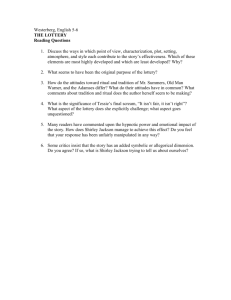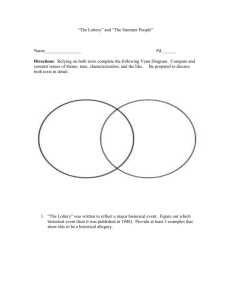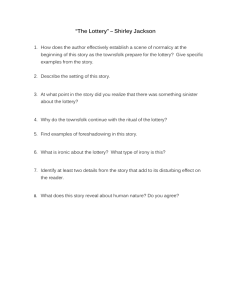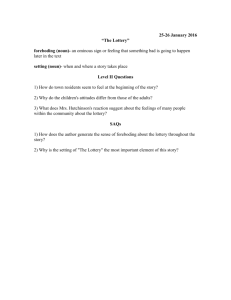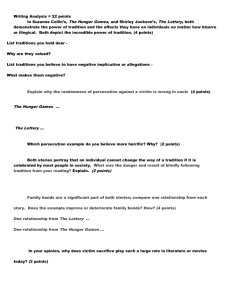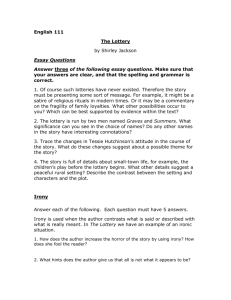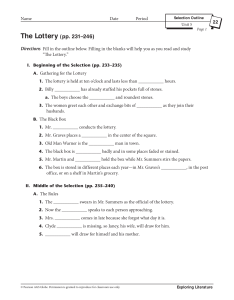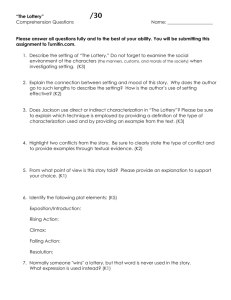Sample 102 essay on "The Lottery"
advertisement
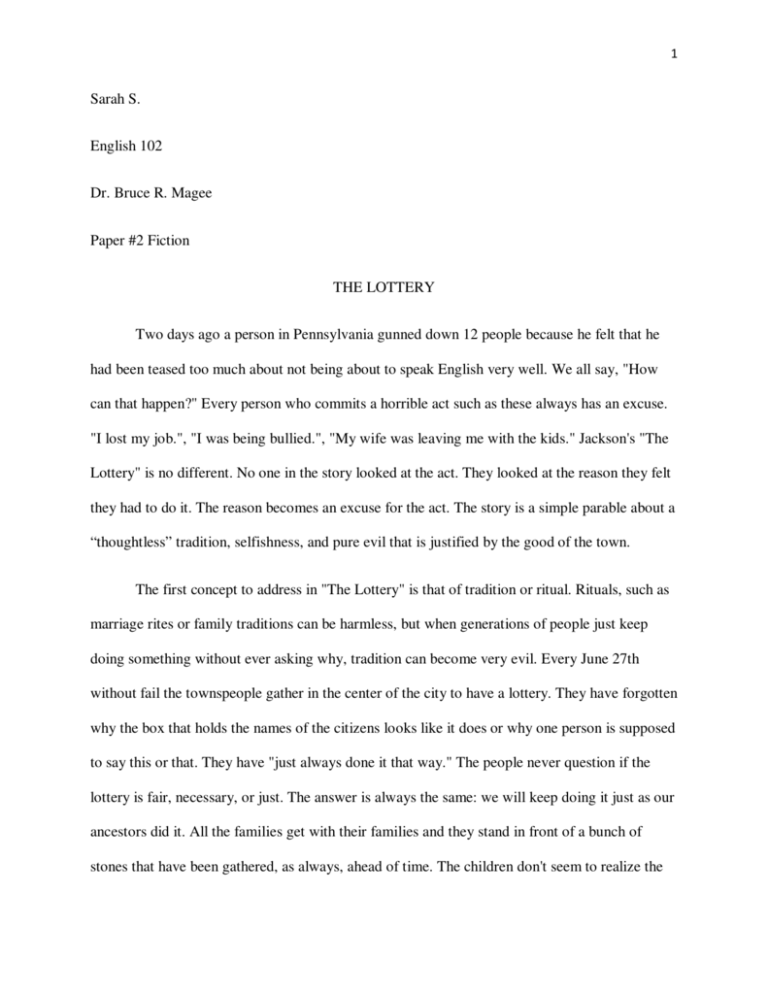
1 Sarah S. English 102 Dr. Bruce R. Magee Paper #2 Fiction THE LOTTERY Two days ago a person in Pennsylvania gunned down 12 people because he felt that he had been teased too much about not being about to speak English very well. We all say, "How can that happen?" Every person who commits a horrible act such as these always has an excuse. "I lost my job.", "I was being bullied.", "My wife was leaving me with the kids." Jackson's "The Lottery" is no different. No one in the story looked at the act. They looked at the reason they felt they had to do it. The reason becomes an excuse for the act. The story is a simple parable about a “thoughtless” tradition, selfishness, and pure evil that is justified by the good of the town. The first concept to address in "The Lottery" is that of tradition or ritual. Rituals, such as marriage rites or family traditions can be harmless, but when generations of people just keep doing something without ever asking why, tradition can become very evil. Every June 27th without fail the townspeople gather in the center of the city to have a lottery. They have forgotten why the box that holds the names of the citizens looks like it does or why one person is supposed to say this or that. They have "just always done it that way." The people never question if the lottery is fair, necessary, or just. The answer is always the same: we will keep doing it just as our ancestors did it. All the families get with their families and they stand in front of a bunch of stones that have been gathered, as always, ahead of time. The children don't seem to realize the 2 seriousness of the event but some of the older people seem a little bit nervous, but no one dares to criticize any part of the ritual or he will be fussed at by the majority. One by one the families all take their turns drawing names. Everyone does well except the one who draws the "bad" slip. When she draws the slip, she begins to protest, but others say to her that she must take it like a brave person. That is how it has "always" been done. They were disgusted when people did not act the exact way they had acted in the past. No need to fuss about it. It was "fair". So she takes her punishment and is stoned by both friends and family. Next, the concept is selfishness. The entire crowd wants this tradition to go on because they want good crops. Good crops meant that they would make money, have a good year, and be able to take care of their families. If they did not do the lottery in June, there would be no corn later. Even though the tradition did not really show statistics that the lottery did not bring "good crops", they were too scared to not do it. Selfishness will make mobs and crowds do things they would not do alone. Katrina had terrible looting because people go crazy and say, 'Well, they are getting new tennis shoes. Why shouldn't I?" Mobs begin to think like animals, and they seem to become entitled to do things because others are doing it. All of the lottery people took the same chance. So it was not their fault that they did not draw the marked paper. No one lifted a hand to help because they were not the marked family. Today, people stand on the sidewalks and watch as people get killed because they do not want to get involved. They are afraid of what others will say and what others might do to them. They were able to "be upon her" and then go back to their simple homes, their supper, and their getting to bed on time for the next day's work. There was not guilt or remorse. They did not have to think about it again because the crops would be good in the fall. 3 Finally, some people are repulsed by reading the story because it is a parable that shows evil done for the sake of the town. We have always debated about evil in our lives by saying well "the means justifies the ends." That means that it does not matter who you hurt as long as the end result is what a person wanted. All wars seem evil at the time because after thousands of people give their lives, those in control say that it was worth it to free thousands or feed thousands. It is hard to say what is right or wrong about that because we don't always know if the good is good enough to make the evil worth it. What if the tradition was true? What if every year the "gods" were good to the town and all the people ate and did not die of starvation? What if one year they did not kill one person, and there was a famine and the whole town died? Would it be worth it? It is something to think about. However, since the author did not expect us to believe in this superstition, just like we don't believe that black cats are unlucky or going under a ladder will cause a person grief, or step on a crack, break your mother's back, he expects us to see that taking all the past "traditions" as fact and never questioning why we are doing something is a very stupid way to live. What is really the most fearful thing about this story is that it is supposed to be a parable, kind of a joke. Yet, today we see this same thinking all over the country. Are we just waiting to pick up a stone?
